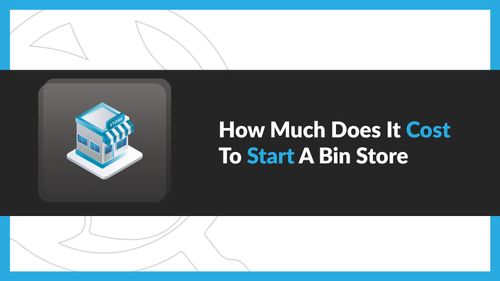Before going into any business, you must consider whether you can afford the startup costs. In the bin store industry, this is crucial. Starting without sufficient funds can cause your store to crumble. Let's unpack what costs you need to consider and how much you should have in the bank before opening your store.
The Cost Of Opening A Bin Store
I’ll be honest: opening up a bin store is not cheap. And because these stores are in the liquidation industry, they rely heavily on cash. That means you need plenty of capital from the start to ensure you don't shut down.
Let's break down some of the costs.

Your Store Space
The first cost you'll have to consider is the rental space for your store. This will be one of your most significant monthly expenses, so you need to be mindful of the size and location of your store.
The security deposit for your rental space can also be quite costly - sometimes as much as several months' rent. You'll also need to consider utilities, taxes, and other fees added to your monthly bill.
Business & Legal Fees
On top of rental space, you also have to consider legal and business fees. This includes registration fees and payments to your lawyers and accountants. Remember - you need a lawyer to ensure you get a fair deal on the rental space. Budgeting for an accountant is also a good idea if you're new to the business world.
Materials & Equipment
There are many material costs involved in opening a bin store. You'll need bags, shopping carts, and bins to cover the basics. Bins can cost quite a bit, though prices vary depending on the market prices and which material you choose for your store. With lumber as high as it is now, you could spend upwards of $5,000 building your own.
Equipment can also cost a lot. You need a forklift or a pallet jack to help unload merchandise. You also have to consider a point of sale system. These can be pricey. On top of that, you need uniforms or t-shirts for employees and basic supplies like toilet paper, paper towels, hand soap, hand sanitizer, cleaning supplies, cleaning equipment, and more. Many people overlook these expenses when starting their business. You cannot afford to do that. Count every expense.
Inventory
Inventory isn't cheap - and you cannot charge it to credit. In this business, everything is cash. That means you need to have plenty of available cash to get started. Before you open, you need at least two truckloads on hand. You should also have enough cash for at least 1-2 additional loads before you open.
So How Much Does It Cost?
It's hard to give an exact number for each of these expenses, as prices vary depending on location and the health of the economy.
In our experience, however, here is our best estimate regarding startup costs.
A smaller store (between 2,000-4,000 square feet) should anticipate $40,000-$50,000 in startup costs. A larger store (5,000-10,000 square feet) should anticipate $80,000-$90,000 in startup costs.
These are base numbers. If you are considering opening up your store - crunch your numbers based on your local prices and the current market. And make sure your bank account is padded with a bit extra to start.

Considering the startup costs, let's say you're planning to open a smaller store. While the costs may be $40,000-$50,000, you may want $60,000-$70,000 on hand to ensure you can handle a few losses in the beginning and tackle emergencies well.
If you're planning to open a larger store, you may want to have $100,000-$110,000 on hand for the same reasons.

You need cash to succeed in the bin store industry. If you put yourself in a position where you're relying on one day's sales to keep you afloat - you're set up to fail. Waiting to start until you have the extra safety net is the best way to play this game.
Wait it out, save the extra, and start your business when you can afford it.

More Financial Considerations For Bin Store Owners
In addition to having adequate financing, you must know how to handle your finances. This business model requires excellent cash flow management. Cash flow management is different from simple profit/loss reporting. Most businesses rely on credit and debt to cover expenses and then offset these expenses with income later. Your business will depend on hard cash to cover expenses.
If you don't have experience in this field, start learning. Take a course on financial planning, bookkeeping, and cash flow management. Get familiar with Quickbooks or another accounting software to manage your finances. And hire an accountant to help you.
Lastly, always have extra. I cannot stress this enough. Do not go into business with "just enough." You need a cushion to succeed in this industry.

Conclusion
The bin store industry is a great way to make money - but it's not for everyone. It requires significant startup capital, excellent financial planning skills, and a bit of luck. If you have what it takes and are willing to do the work - go for it! This could be a very lucrative endeavor for you, and we wish you the best!

